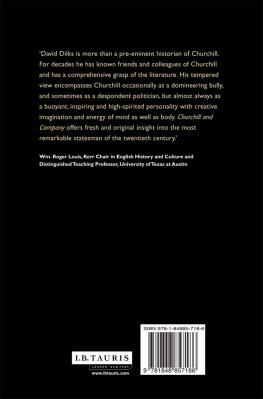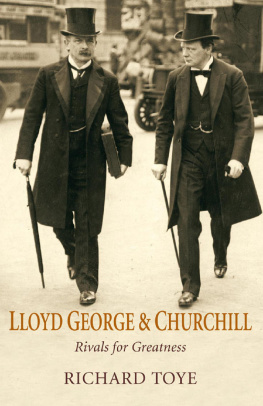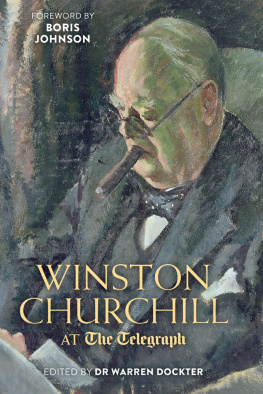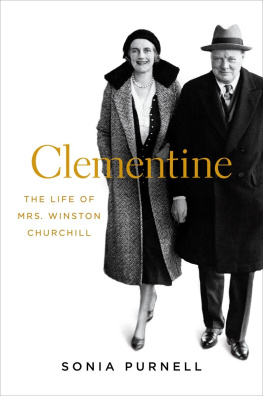David Dilks was for more than 20 years Professor of International History at the University of Leeds, and then Vice-Chancellor of the University of Hull. He previously worked as research assistant to Sir Anthony Eden, Mr Harold Macmillan, Lord Tedder and others closely associated with Churchill, and served as President of the International Committee for the History of the Second World War from 1992 to 2000. He is the author of Curzon in India, Neville Chamberlain and The Great Dominion: Winston Churchill in Canada 19001954, and editor of The Diaries of Sir Alexander Cadogan.

Published in 2012 by I.B.Tauris & Co Ltd
6 Salem Road, London W2 4BU
175 Fifth Avenue, New York NY 10010
www.ibtauris.com
Distributed in the United States and Canada Exclusively by Palgrave Macmillan 175 Fifth Avenue, New York NY 10010
Copyright 2012 David Dilks
The right of David Dilks to be identified as the author of this work has been asserted by him in accordance with the Copyright, Designs and Patents Act 1988.
All rights reserved. Except for brief quotations in a review, this book, or any part thereof, may not be reproduced, stored in or introduced into a retrieval system, or transmitted, in any form or by any means, electronic, mechanical, photocopying, recording or otherwise, without the prior written permission of the publisher.
ISBN: 978 1 84885 718 6
eISBN: 978 0 85773 287 3
A full CIP record for this book is available from the British Library
A full CIP record is available from the Library of Congress
Library of Congress Catalog Card Number: available
Preface
On the evening of Friday, 23 February 1945, the Prime Minister listened in the Great Hall at Chequers as The Mikado was played on the gramophone. The sounds revived in his mind memories of the Victorian era, eighty years which will rank in our island history with the Antonine age. Half a century earlier, in the glaring noonday of Bangalore, Lieutenant Churchill had devoured volume after volume of Gibbons Decline and Fall of the Roman Empire. There he had read The reign of Antoninus is marked by the rare advantage of furnishing very few materials for history; which is indeed little more than the register of the crimes, follies, and misfortunes of mankind. While Churchills own times furnish by contrast such abundant material that it overbears our capacity to assimilate, they were certainly not wanting in crimes, follies and misfortunes. No one reflecting on the history of the twentieth century can doubt or escape the significance of despots and their dogmas or the murderous consequences of regimes made possible by the march of applied science. From Stalin to Hitler, Mao to Pol Pot, the tyrants bestride the pages.
This is a book about one of the heroes of the century, who worked within a political system and set of assumptions far removed from those of the dictators. Writing of Churchill with admiration, I have also tried to apply the critical scrutiny which he would have expected. My purpose has been to place him side by side with others, and where the context suggests it to put what he said and thought alongside their opinions and reactions. Both angles of view are indispensable if we are to form a faithful picture. None understood the perils of such an enterprise more acutely than the Chief of the Imperial General Staff, Alan Brooke. I wonder whether any historian of the future will ever be able to paint Winston in his true colours he wrote in 1943 after days of high tension. It is a wonderful character the most marvellous qualities and superhuman genius mixed with an astonishing lack of vision at times, and an impetuosity which if not guided must inevitably bring him into trouble time and again.... He is quite the most difficult man to work with that I have ever struck, but I should not have missed the chance of working with him for anything on earth!
The first section of this book attempts to portray the essence of Churchills character and springs of action, and his many-sidedness as artist, writer, politician and colleague. How I wish I could advance a grander claim, to unveil an unknown Churchill! As to the main facts, however, we now know most of what can be learned, for he wrote more amply about himself than any other Prime Minister has done and is the subject of innumerable studies. I hope that readers will nonetheless find here some fresh perspectives. Most of the chapters which follow spring from unpublished papers given at conferences, or in three instances from lectures which after some hesitation I decided not to recast, despite the change of style between the sobriety of the written word and the flourishes of the spoken. It is perhaps a measure of the sustained interest in Churchill all over the world that one of these pieces was offered as a tribute to a colleague in Poland; one originated as an address given in France and another as a speech delivered in Toronto to a Society which commemorates Sir Winstons example; and Chapter 2 was composed in its first form for a conference consisting largely of visitors from the Commonwealth.
Though the essays are designed to be free-standing, all are intended to illuminate Churchills activities among friends and enemies. Sometimes those categories are not easily separated; for a long while, Churchill thought of Stalin as a friend or at least a comrade-in-arms, and only with extreme reluctance did he come to look upon the new Czar of all the Russias as an enemy. He regarded Roosevelt with admiration and gratitude, whereas the balance of the evidence suggests that the President felt less warmly towards him, especially from 1943. Some of the chapters show Churchill as the dominant force in a variety of situations; others, like the one entitled Epic and Tragedy, reveal him and the War Cabinet in the grip of issues which they could influence only in a limited degree. The second chapter was written because outside the realm of the experts, the scale of the Commonwealths exertions during World War II is too seldom appreciated. It reflects poorly upon us in this country that it should be so. The last chapter, unlike the others, does not delineate a particular crisis or chain of events. Its purpose is to draw attention to the influence of history on statesmen and others, not least because no public man of the last century with the possible exception of General de Gaulle has combined on Churchills scale, or with his effectiveness, the writing and the making of history. The unceasing references during our present economic troubles to the lessons of the 1930s may perhaps give some point to such reflections. Never in the field of human argument can the name of a single thinker have been prayed in aid by so many politicians and commentators, or advanced in support of so many propositions quite incompatible. Keynes own remark that practical men of affairs are often the slaves of some defunct economist has not lost its piquancy now that the defunct economist is Keynes himself.
Every part of the book illustrates the constant problems and occasional opportunities of working within severe constraints, the inevitable fate of this country in the middle of the twentieth century. As Churchill used to remark, the only thing worse than waging war with allies is to wage war without them. In that context his prolonged study of his ancestor the Duke of Marlborough paid a dividend which no one could have foreseen when he embarked on the enterprise in 1929.
France looms large, as in any study of Churchill it should. He loved the place for its history and associations, and could scarcely conceive of a Europe without the French army and French values. That said, the official France with which the British government had to deal between 1940 and 1945 was a different proposition from the France which Churchill cherished. I know there are many Frenchmen who do not like Great Britain, he said with some sadness. They have a perfect right to their opinion. Mais ce ne sont pas les Franais que je recherche. In old age, he did not feel called upon to deny with vigour the story that he had once described de Gaulle as resembling a female llama surprised in her bath. When every allowance is made, it remains a staggering fact that on the very morrow of victory, and victory by a hairs-breadth at that, the two countries could have come almost to the point of war in May 1945.
Next page













